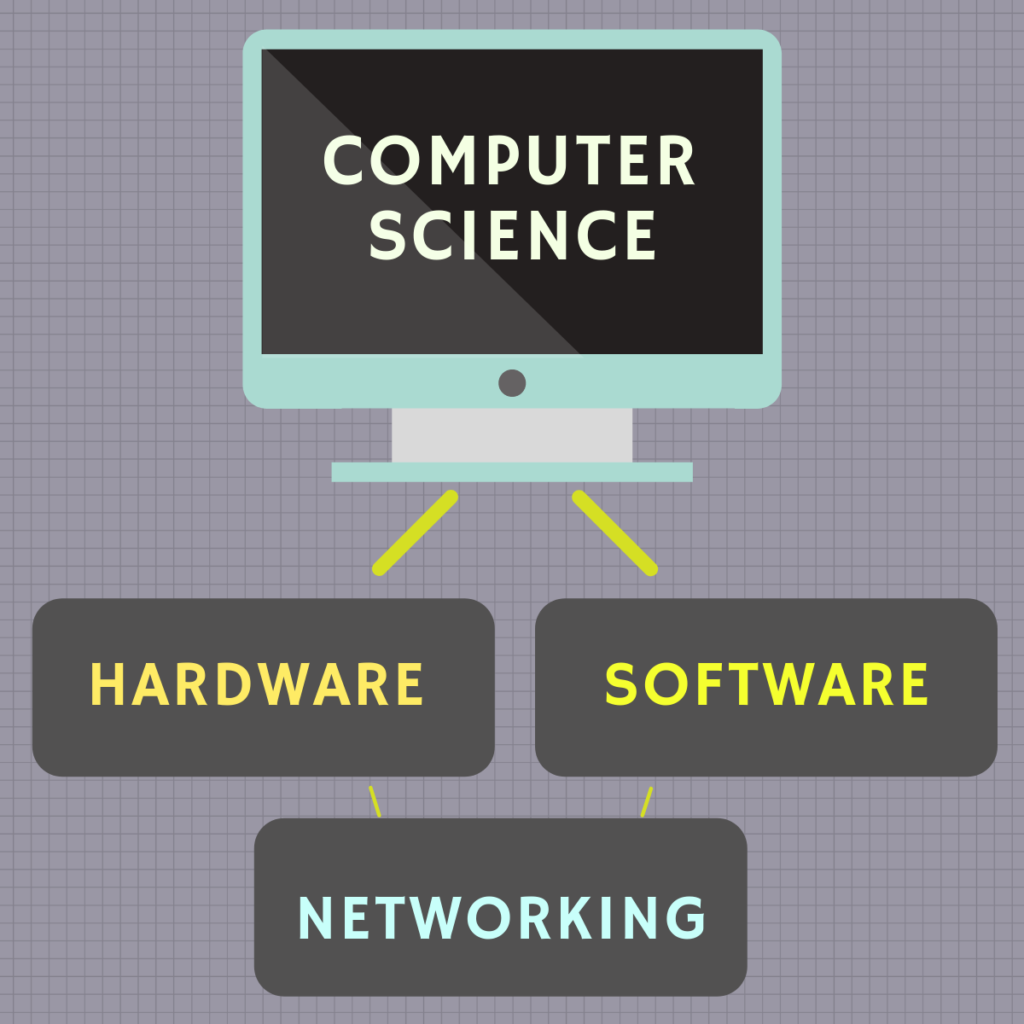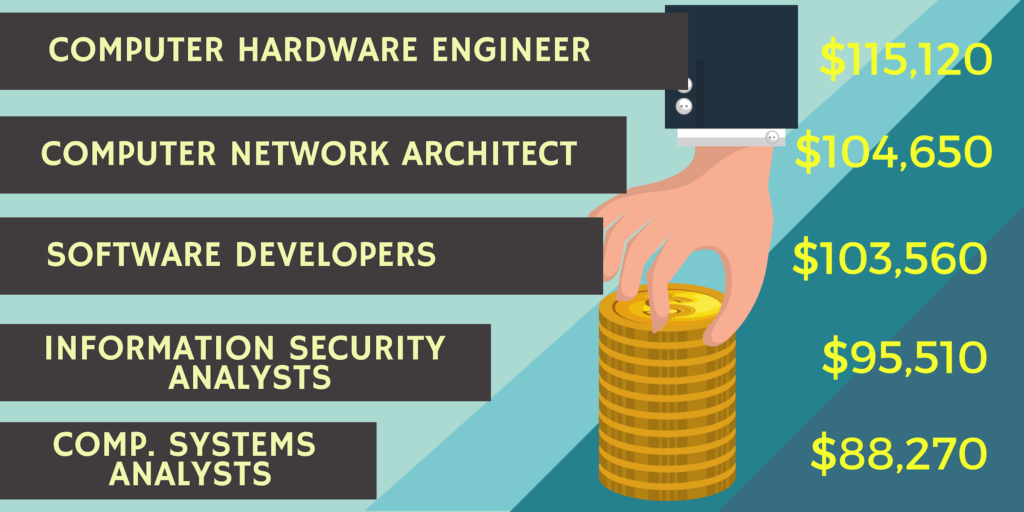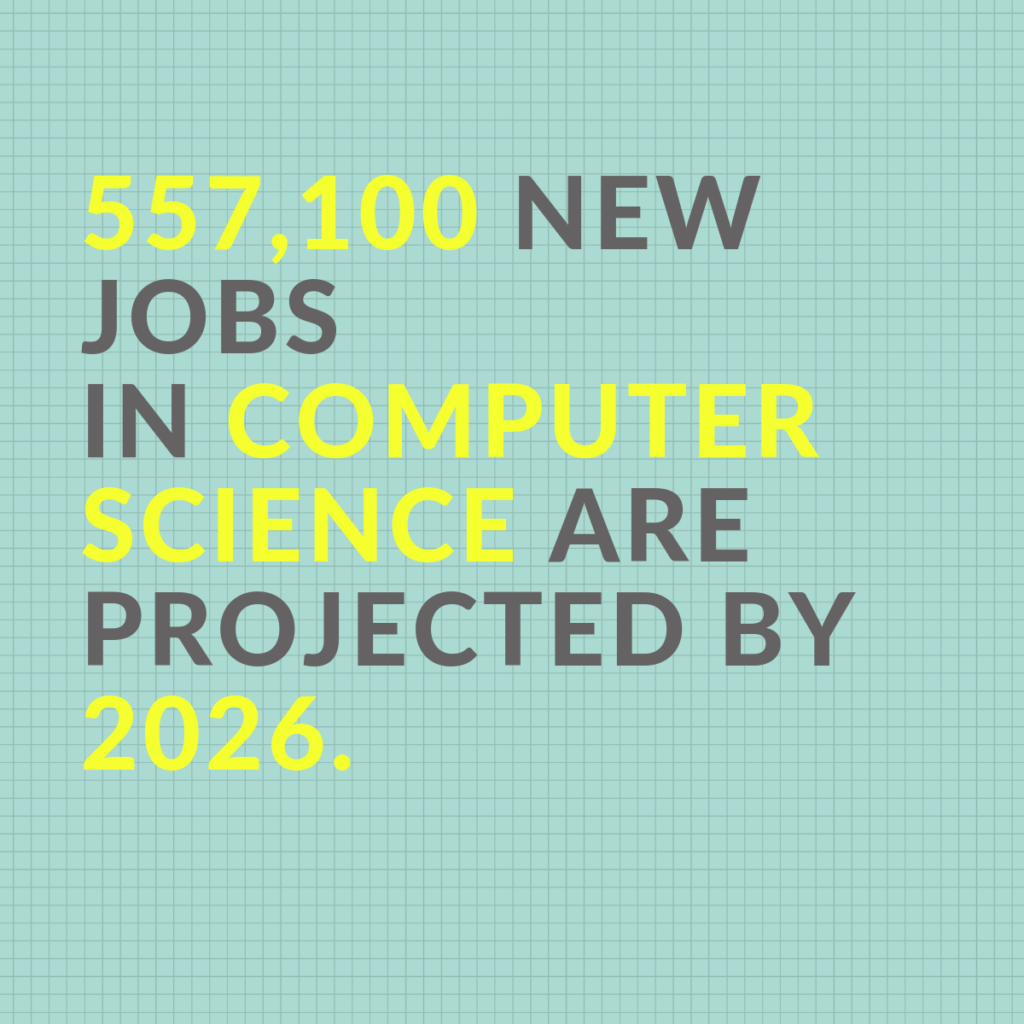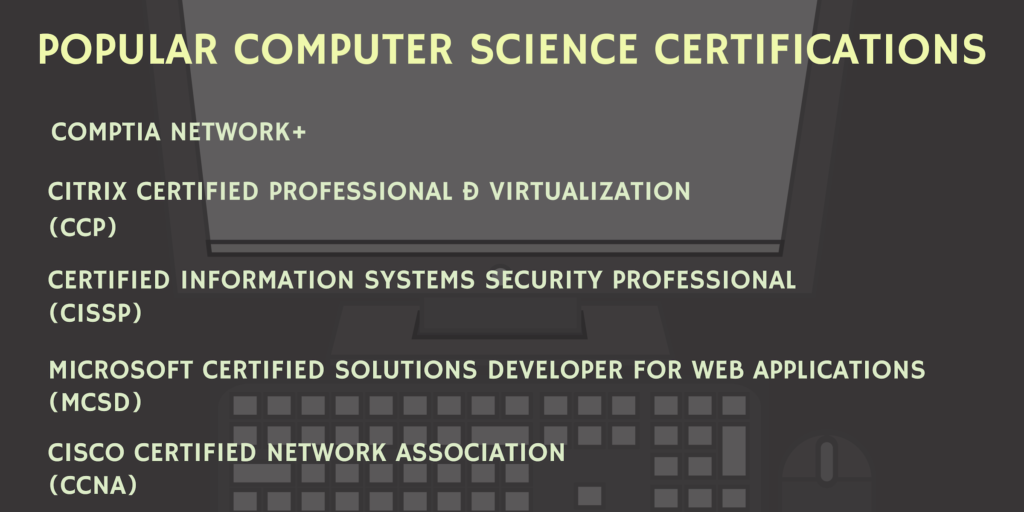“Whether you want to uncover the secrets of the universe, or you just want to pursue a career in the 21st century, basic computer programming is an essential skill to learn.”
-Stephen Hawking
![]()
From classrooms to operating rooms, from social networks to the stock exchange, our lives run on computer technology. It’s almost impossible to imagine a world without computers, and harder still to imagine where they will take us next. Behind every piece of hardware and software is a team of computer science experts, improving existing pieces of technology and creating new ones.
If you have an analytical mind, a flair for math, systematic thinking and the power to innovate, you may be cut out for a future in computer science. For that, you’ll need a computer science degree. Peruse our Complete Guide to Computer Science Degrees to get a fast overview of this essential field.
What is Computer Science?
Computer science computer scientists study, understand, and apply the theory behind computational applications to create the vital computing technology of today… and tomorrow. According to Wikipedia,
“Computer science is the theory, experimentation, and engineering that form the basis for the design and use of computers. It involves the study of algorithms that process, store, and communicate digital information.”
Whether it’s a smartphone, robotic vacuum, laptop, or space probe, computers are more than just machinery. Programs and connectivity make them functional. As such, computer scientists work within three essential areas: hardware, software, and networking.
Hardware refers to the design of computers themselves, and overlaps with the field of electrical engineering. Computers can’t “think” unless their “brain” has been built through the correct hardware. Computer scientists know about fundamentals like binary operations and logic gates, and advanced concepts like operations and processor architecture.
Software refers to the programs that computers run- complex sets of computations that they perform in response to commands. In computer science, this includes both programming concepts and the many programming languages that exist. Software makes up applications and operating systems. Computer scientists understand algorithms, functions, and the design of source code. They are also familiar with languages like Java, Python, and C++. This aspect of computer science also touches on the user experience, such as graphics and user interface.
Networking refers to internet and network technologies, such as telecommunications and internet protocols. Computer scientists have familiarity with networking concepts and practical applications like network administration and web design.

What Do Professionals in Computer Science Do?
Just as computer science covers a number of areas, those with a computer science degree practice in a number of related fields. Some do practice as “computer scientists,” researching computers and developing new technology, but you won’t find a lot of these research-focused positions on the job market. Instead, you’ll find lots of positions in different specific applied areas of computer science, designing, improving, and fixing the hardware, software, and networking tech discussed above. Some of the most common jobs with a computer science degree include software developer, network administrator, web developer, information security analyst, and computer systems analyst.
In order to work in the field of computer science, no matter what your position, you’ll need to be an analytical thinker. In other words, someone who likes to gather information and use it to solve problems and make logic-driven decisions. Computer science is like solving puzzles, and requires patience and clear, logical thinking. You’ll also need to have math aptitude. You can’t have algorithms without math, and this fundamental skill is an absolute essential. Computer scientists also need a certain type of creativity in order to develop novel solutions to problems and to innovate. Communication and interpersonal skills are also key for those in computer science who are tasked with leading others or conveying computer science ideas to non-tech outsiders.
What Jobs are there in Computer Science?
There are a wide number of jobs in the field of computer science, and more are popping up every day as technology develops and becomes more widespread. Peruse a tech job board and you’ll see specialized titles like Technical Automation Informatics Specialist and Healthcare Customer Relationship Management Business Analyst. You’ll also see jobs with more broad titles like Web Developer. Almost across the board, there is high demand for computer science degrees, and the majority of those with this credential work in one of the following fields.

Software Developer
Software Developers design the programs that run on our computers and computing devises like smartphones and wearables. They create the code behind the applications, and are responsible for the development, testing, and the maintenance of software. Needless to say, software developers must have fluency in programming languages like JavaScript, Python, Java, PHP, and C++. This discipline requires a certain flair for creativity, as this type of computer science involves a lot of innovation.
The Bureau of Labor Statistics(BLS) states that software developers earn, on average, $103,560 per year. In addition to this excellent salary, this job is in high demand; the BLS also notes that jobs in this field are projected to grow a full 24% by 2026, a rate much faster than the national average for job growth.
Learn more about which degree is best for a software engineer.
Database Administrator
Database administrators are responsible for compiling and maintaining databases for companies and other organizations and controlling who can access them. They work closely with information systems managers to design data storage solutions. Database administrators need to have a deep understanding of information security, as well as problem-solving skills and flexible thinking, to keep up with a company’s evolving data management needs and prevent malfunctions.
The BLS reports that database administrators make a median salary of $87,020 per year, and that demand for these professionals is growing at a faster-than-average rate of 11%.
Computer Hardware Engineer
A computer hardware engineer is the architect behind computers and computing devises. These tech professionals use their computer science degree background to create, develop, test, and improve the hardware that makes computers work, such as circuit boards, memory banks, and routers. In this hands-on field, computer hardware engineers need to be systematic thinkers and have technical expertise, along with the patience to apply rigorous testing methods.
According to the BLS, computer hardware engineers make a median salary of $115,120 per year, and that the field is growing at a rate of 5%.
Computer Systems Analyst
Unlike the computer science developers and engineers discussed above, computer systems analysts are in charge of evaluating and analyzing computer systems, rather than creating and developing them. Computer systems analysts, sometimes called “systems architects,” assess the computer systems for an organization and look for ways to improve their functionality, efficiency, and security through changes to the organization’s software and hardware.
In order to do this, computer systems analysts have to have a broad understanding of all the relevant areas of computer science- in other words, what makes hardware, software, and networks work well (and what causes them to fall short). In addition, they also need the communications skills required to explain technical information, and the decisions about it, to non-tech personnel. They need to have great written and verbal skills and also to be persuasive enough to assure organizations of the need for systematic changes. Business skills are also a big plus in this field, as many changes to computer systems will affect- or even be driven by- business interests.
The BLS reports that computer systems analysts take home an average salary of $88,270 per year. The field is expected to grow at a healthy rate of 9% per year.
Computer Network Architect
Computer network architects are responsible for designing and building data communication systems. These include LANs (Local Area Networks), WANs (Wide Area Networks), intranets and extranets. These computer science degree holders work to assess an organization’s needs and to develop and deploy networking solutions. They establish simple networks between computers in small offices and massive networking connections such as large-scale cloud-based infrastructures. Analytical skills and broad, systemic thinking are key in this computer science job. Computer network architects also need the perseverance to methodically test their networks before and after launching.
The BLS states that computer network architects earn $104,650 per year, an impressive salary that’s almost three times the national average. The field is expected to grow at a rate of 6% by 2026.
Information Security Analyst
In the age of high-profile security breaches, the importance of an information security analyst cannot be overstated. These computer science professionals evaluate the security of an organization’s websites, computer systems, and networks, finding areas of vulnerability and developing ways to safeguard sensitive data. Information security analysts need to be able to act as security sleuths, tracking down weaknesses and anticipating threats. They must also have impeccable professional integrity and responsibility, as they deal with sensitive, important, and voluminous data.
According to the BLS, information security analysts make $95,510 per year on average. Best of all, the field is growing at an astonishing rate- one which will likely continue as cybersecurity threats continue to mount. The BLS anticipates that jobs in information security analysis will increase by 28% by 2026- over four times the national average for job growth!
(Learn more about the benefit of a degree in cybersecurity vs. network security.)
How Much Money Can I Make with a Computer Science Degree?
There’s no doubt about it- at every degree level and in every discipline in the field, a computer science degree is a sound investment. It’s no secret that the tech field is growing by leaps and bounds- our computers, tablets, and smart devices are smarter and more powerful than ever. At the same time, tech is increasingly used to deliver services and improve outcomes in non-tech fields like education, healthcare, and sports. All that adds up to an excellent job market- and great salaries- for those with a computer science degree.

According to Forbes, a computer science degree is the #1 choice for highest starting salary, with an impressive average of $66,800. That’s an excellent paycheck right out of college. As with all jobs, salaries rise with experience, and mid-career professionals make even more. Glassdoor reports that, the overall average salary for those with a computer science degree is $123,309.
Some of the highest-paying jobs associated with a computer science degree are found at the intersection of business and computer science. Companies are constantly seeking ways to leverage tech to improve their efficiency and gain an edge over the competition, and those with business savvy and a knack for tech can earn an outstanding income. A business systems analyst can earn $75,000-$109,000 and a Customer Relationship Management Analyst (or CRM Analyst) earns between $80,000 and $109,000.

Computer science professionals in leadership roles earn top salaries as well, exerting a special combination of managerial and technical skill. Payscale reports that a mid-career Software Development Director can expect to make $154,000, while a mid-career Software Development Manager earns an average of $130,000.
What’s the Job Outlook for Computer Science?
Computers and software are more omnipresent than ever- from your Apple watch to your smart thermostat- and pros with a computer science degree have the skills to be a part of this massive growth area. In fact, the BLS reports that software and application developer is the 5th fastest-growing job in the nation, and anticipates over 1 million jobs in this field by 2026.

The entire computer science and IT sector can expect to see robust growth, too. Across all areas of computer science and information technology, the BLS projects a growth rate of 13%, twice as fast as the national average for job growth. Other sources back up these bright projections. Business Insider recently ranked the “10 hottest tech jobs,” and no less than 13 of the 15 hottest were computer science jobs.
What Can I Do with an Associate’s in Computer Science?
If you want to get started in the field right away, an associate’s in computer science is the way to go. This degree requires the minimum investment of time and money. An associate’s degree traditionally takes two years to earn, and will quality you for entry level computer science jobs.
Typically, an associate’s degree program consists of 60 semester credit hours (or 90 quarter credits), or 20 courses in all. Your classes will cover computer science fundamentals like:
- Programming
- Information Systems Management
- Calculus
- Network Fundamentals
- Web Design
Classes will tend to have an applied, rather than theoretical focus, so you can enter the job market ready to work. Some associate’s programs also offer specialization like game programming or health informatics.
Jobs available with an associate’s degree in computer science are generally entry-level, and include:
- web designer
- computer support specialist
- software developer
- computer programmer
An associate’s in computer science can allow you to get your foot in the door, but to advance your career, you’ll need gain skills through experience or by earning a bachelor’s degree in computer science.
What Can I Do with a Bachelor’s in Computer Science?
Most people who study computer science choose to earn a bachelor’s degree. Why? This comprehensive degree covers computer science in depth and offers students the potential to specialize in an area of interest. In fact, a bachelor’s degree in computer science is one of the most valuable degrees available, and, along with engineering, was ranked as the bachelor’s degree with the highest starting salary for 2018 by the National Association of Colleges and Employers. The average salary associated with a bachelor’s degree upon graduation? An impressive $66,005.
A commuter science bachelor’s degree comprises about 120 credits, and takes four years to earn on a full-time basis. If you’re not already fairly advanced in math, or if you opt for a dual specialization, you may find you’ll need to take additional courses, which will lengthen your time to completion. In a computer science bachelor’s program, you’ll learn in depth about programming languages, databases, and algorithms, and can select advanced areas of specialization as you move through your coursework. Classes may include topics like:
- Calculus
- Computer Networking
- Software Development
- Data Management
- Systems Operation
Many, if not most, computer science bachelor’s programs offer concentrations in specific areas like Artificial Intelligence and Human-Computer Interaction. Most schools also require a senior project and/or an internship in the field, to solidify your classroom learning in the field.
Most computer science bachelor’s degrees are offered as a Bachelor of Science (BS), though some are also offered as a Bachelor of Arts (BA). The only difference is that the Bachelor of Science degree has a stronger math and science focus, while the Bachelor of Arts degree will incorporate studies in the humanities. If you’re looking for a fully technical career, such as a computer engineer, a BS may be a better choice. Those considering a computer science career that involves more communication and business may want to consider a BA.

This degree is the minimum most employers look for, and will qualify you for such computer science positions as:
- Computer Programmer
- Computer Engineer
- Software Architect
- Database Architect
What Can I Do with a Master’s in Computer Science?
Forbes recently included a master’s in computer science among its list of “top degrees for getting hired.”. Professionals who hold a master’s degree in computer science earn, on average, 38% more than their peers with a bachelor’s degree in computer science. Data from salary.com, study.com and the BLS shows that a computer science master’s degree is associated with a starting salary of $83,000, on average, and a mid-career salary of $129,900.

A master’s degree takes two years to earn on a full-time basis, and requires an existing bachelor’s degree in a related field (computer science or IT) as a prerequisite. A number of schools offer an accelerated, 5-year combined bachelor’s and master’s degree program. On the other hand, many professionals working in the field of computer science pursue their master’s on a part-time basis (often through online classes), and take 3-4 years to complete their master’s degree. Class topics may include:
- Software Architecture
- Artificial Intelligence
- Parallel Processing
- Database Systems
In addition to your classes, you’ll typically complete a project- or research-based capstone project, which will allow you to learn to apply your class-based knowledge. A masters degree is a good choice if your field of interest involves research and development, business, or advanced topics like machine learning.
What Can I Do with a PhD in Computer Science?
PhD’s in this field are generally reserved for those who wish to become professors of computer science, or computer research academics. In order to earn a PhD in computer science, you’ll spend 4-7 years creating and defending a doctoral thesis on an area of new research, which you’ll select based on your interests and with the guidance of your thesis advisor. Payscale reports that a PhD in computer science is associated with an average salary of $124,000.
What Technical Training in Commuter Science is Available?
In addition to degrees in computer science, many computer science professionals choose to advance their skills by enrolling in coding boot camps. These intensive programs can last as little as six weeks and offer an immersion in the latest coding practices. They focus on career-relevant coding skills, many aimed at achieving a career in web development.

Certifications are another option. Computer science certifications prove skills in a specific area of practice, like Routing and Switching and Information Systems Auditing.. Each is offered by an independent certification body, and requires applicants to pass a comprehensive exam and pay a testing fee. A non-degree training course can prepare you for these rigorous examinations.
Many computer science professionals earn multiple certifications in addition to their computer science degree in order to demonstrate their specialized expertise to employers. Some of the most popular computer science certifications in today’s market include:
- Certified Information Systems Security Professional (CISSP)
- CompTIA Network+
- Cisco Certified Network Association (CCNA)
- Citrix Certified Professional Ð Virtualization (CCP-V)
Further Reading:
- The 20 Best Online Masters in Computer Science Degree Programs
- The 20 Best Artificial Intelligence Degree Programs Online
- Top 10 Highest Paying Jobs in Computer Science
- What Is the Benefit of an Electrical Engineering Degree Vs a Computer Science Degree?
- What are some of the Degree Choices to be a Cyber Threat Analyst?
- What Is the Benefit of a Computer Hardware Engineering Degree Vs a Computer Programming Degree?
- What Degree Do I Need to Be an Intelligence Analyst?
- What Are the 5 Best Careers in Environmental Science?
